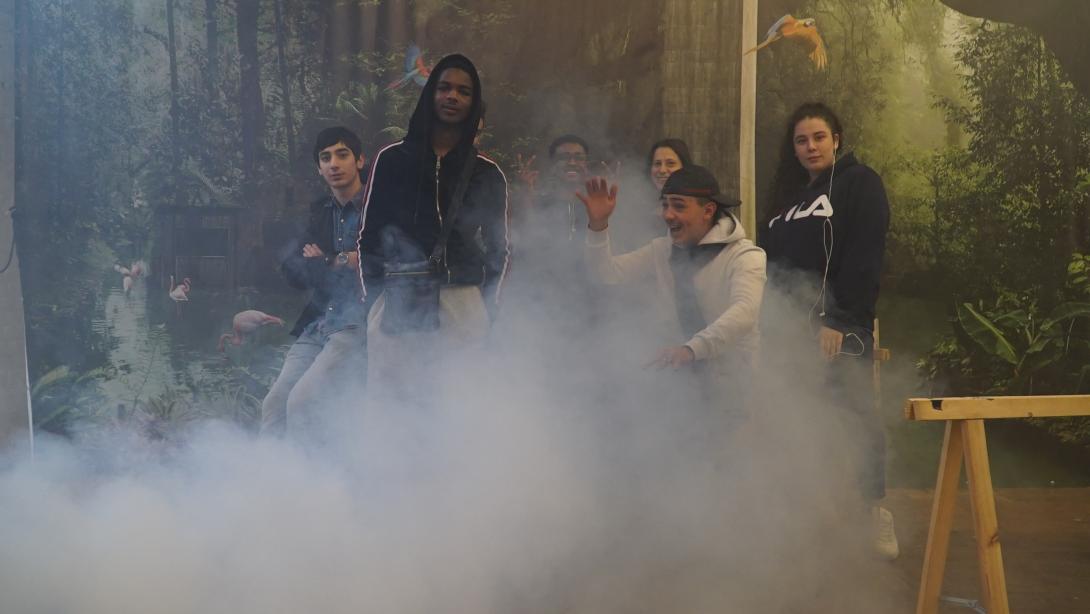Close Encounters
Lees hier het digitale programmablad van Close Encounters
Over de creatie van Close Encounters
Een tekst van het Close Encounters team over het creatieproces. Algemene informatie over de voorstelling en de credits vind je hier.
Close Encounters is tot stand gekomen in de loop van 2021, in 8 sessies met 13 jongeren tussen 14 en 20 jaar en 4 volwassenen geboren tussen 1974 en 1996, van wie sommigen maar liefst 5 verschillende talen spraken. We namen 52 uur aan gesprekken op, gooiden 132 pingpongballen in de lucht en verwelkomden vorige week elf nieuwe jongeren bij het project.
De sessies gingen van start tijdens de tweede lockdown. Terwijl we ons afvroegen of we de voorstelling op een bankje in de stad, op drijvende kano's of per telefoon wilden brengen, besloten we dat we elkaar wilden ontmoeten, in een kamer, in het echt.
Daarom zijn we nu hier, terwijl we de tijd tussen jou en ons proberen in te ademen. Samen voeren we een dialoog, die uit meerdere dialogen in één bestaat. We hebben twee aan twee met elkaar gesproken, vertrekkend vanuit verschillende perspectieven en verscheidene onderwerpen. Onze leeftijd, huidskleur, ons geslacht en onze verlangens zijn uiteenlopend, maar onze vele woorden zijn samengekomen in een dialoog, die van ons is. Een dialoog die ons allen aangaat en te veel is voor één persoon. De woorden in deze dialoog komen uit onze de doorleefde ervaringen. Ze zijn uitgesproken, ze betekenen iets voor iemand van ons. Vandaag willen wij ze, met jou, opnieuw tot leven brengen.
What's not to love?
“What’s not to love” van Peter Crawley over Your words in my mouth in 2019.
Close Encounters is het slotstuk van een drieluik. Alle drie de voorstellingen Close encounters, Your words in my mouth en A Certain Value gaan over het perspectief van andere mensen, over gemeengoed, liefde, intimiteit en de mogelijkheid tot een verandering. Hieronder lees je een tekst over Your words in my mouth, een voorstelling die aan dezelfde thema’s raakt als Close Encounters.
What do we talk about when we talk about love? The short answer, Anna Rispoli makes clear, is that we talk first about ourselves: our experience, reflections and imagination. The playful conceit of their production, though, is to make us not just consider but also represent the perspectives of a distant stranger.
Bringing small audiences into a series of intimate venues, and asking us to renact a conversation that took place somewhere else, may be an unconventional and unrehearsed act of theatre, but it provides a disarmingly subtle route into one of theatre’s more fundamental aims: to arouse empathy, to put yourself in someone’s place.
To be both performer and audience is a curious thing, at once dividing and sharpening attention. Here, the pricks of self-consciousness (the sound of your voice, your eyesight, your cues) gradually dissipate to allow your “character”, and that in front of you, to materialise, each advancing views that flatter, amuse or affront your own.
Love, no less than art, is a political subject, quickly ushering in conversations about traditional monogamy, the emotional complexity of open relationships or the exhausting efforts of polyamory, one proponent’s antidote to “a society that is institutionalising itself around the couple”. To some people, even two is a crowd.
You may forget, for instance, the sex or age of a speaker, blurring into their reader, and concentrate better on the opinion. You listen carefully to yourself and each other.
Even if just for an hour, you assume a wholly new identity, you see yourself differently and become absorbed in different views. What’s not to love?

